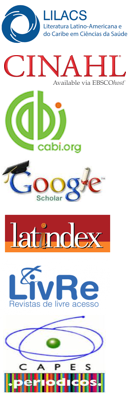Comparative Analysis of Postural Balance in Elderly Individuals With and Without Parkinson’s Disease
DOI:
https://doi.org/10.17921/2447-8938.2011v13n3p%25pResumo
Parkinson’s disease is an age-dependent neurodegenerative disease, the prevalence of which increases among older individuals. The aim of the present study was to perform a comparative analysis of postural balance among elderly individuals with Parkinson’s (Parkinson Group – PG) and elderly individuals without Parkinson’s (Non-Parkinson Group – NPG) as well as a control group (CG) of younger adults, using balance platform parameters. The study was carried out at a medical and geriatric clinic in the city of Jales, SP, Brazil. Twenty-six elderly individuals with Parkinson’s and 25 without Parkinson’s were selected. The CG was made up of 20 young adults. Mean age in the groups was 75.09 ± 6.61, 73.86 ± 8.12, and 35.90 ± 7.88, respectively. A balance platform (Footwork) was used for the data acquisition. There were no statistically significant differences between the PG and NPG regarding displacement velocity (P) or radial displacement (Rd) for the right and left feet (p > 0.05), whereas there was a significant increase in these parameters in both elderly groups when compared to the CG (p < 0.001). Regarding Parkinson Stages I, II and III, there was a tendency toward an increase in P and Rd values in Stage III. The data of the present study demonstrated no statistically significant differences between elderly individuals with and without Parkinson’s disease regarding the variables P and Rd, while there was a significant increase in the value of these parameters when comparing elderly individuals to younger adults.
Downloads
Downloads
Publicado
Como Citar
Edição
Seção
Licença
Os autores devem ceder expressamente os direitos autorais à Kroton Educacional, sendo que a cessão passa a valer a partir da submissão do artigo, ou trabalho em forma similar, ao sistema eletrônico de publicações institucionais. A revista se reserva o direito de efetuar, nos originais, alterações de ordem normativa, ortográfica e gramatical, com vistas a manter o padrão culto da língua, respeitando, porém, o estilo dos autores. As provas finais serão enviadas aos autores. Os trabalhos publicados passam a ser propriedade da Kroton Educacional, ficando sua reimpressão total ou parcial, sujeita à autorização expressa da direção da Kroton Educacional. O conteúdo relatado e as opiniões emitidas pelos autores dos artigos são de sua exclusiva responsabilidade.


